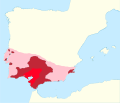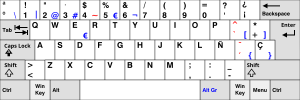 | Lusitanian (so named after the Lusitani or Lusitanians) was an Indo-European Paleohispanic language. There has been support for either a connection with... 34 KB (3,692 words) - 12:49, 31 March 2024 |
The Lusitanians were an Indo-European-speaking people living in the far west of the Iberian Peninsula, around roughly to Central Portugal (what's nowadays... 27 KB (3,050 words) - 12:04, 13 April 2024 |
Lusitanian mythology is the mythology of the Lusitanians, an Indo-European speaking people of western Iberia, in what was then known as Lusitania. In present... 15 KB (1,750 words) - 18:49, 1 February 2024 |
 | they would prefer to identify the language of the stelae with a different title: "southwestern" or "south-Lusitanian". There is general agreement that... 27 KB (3,007 words) - 16:06, 8 April 2024 |
Lusitania (disambiguation) (redirect from Lusitanian) modern Portugal. Lusitania, Lusitanian, and Lusitanic may also refer to: Lusitanian language Lusitanian mythology Lusitanians, the original Indo-European... 1 KB (180 words) - 13:31, 22 January 2023 |
 | discovered Lusitanian inscriptions, that clearly show that Lusitanian cannot be a celtic language and in fact approaches the Italic languages. Gallaecian... 11 KB (1,154 words) - 12:27, 8 April 2024 |
defense, information and services company Lusitanian language (ISO 639-3 code), an Indo-European Paleohispanic language Midwest Questar XLS, an American ultralight... 507 bytes (97 words) - 23:42, 14 February 2023 |
Belgian-language origin. Characteristics of Belgian are said to include the retention of p after the sound shifts, a trait that it shared with the Lusitanian... 6 KB (604 words) - 15:15, 4 July 2023 |
 | language Celtic languages Celtiberian language Gallaecian language Lusitanian language Punic language Latin language Guanche language Galician-Portuguese... 23 KB (1,949 words) - 00:31, 17 April 2024 |
 | List of the Pre-Roman peoples of the Iberian Peninsula (category Articles containing Spanish-language text) Extremadura (Spain). They spoke Lusitanian that is a clearly Indo-European language but the filiation as a Celtic language is not surely proven (although... 30 KB (3,190 words) - 11:07, 18 April 2024 |
This list contains purported Lusitanian deities, that is the gods and goddesses of Lusitanian mythology. Abna Aernus Aetio Albucelainco Ambieicris Arabo... 4 KB (331 words) - 18:39, 9 February 2024 |
 | previously spoken in the Iberian Peninsula. These languages included Proto-Basque, Iberian, Lusitanian, Celtiberian and Gallaecian. The first documents... 227 KB (16,234 words) - 15:20, 17 April 2024 |
 | Lusitania (section Lusitanians) Romans arrived in the territory during the 2nd century BC, a war with Lusitanian tribes ensued between 155 and 139 BC, with the Roman province eventually... 31 KB (2,908 words) - 13:54, 9 March 2024 |
but several modern scholars have postulated Lusitanian and Gallaecian as a single archaic Celtic language. Others point to major unresolved problems for... 26 KB (2,974 words) - 09:38, 8 April 2024 |
List of English words of Portuguese origin (category Articles containing Arabic-language text) that few additions to any non-Iberian Peninsula languages date to the era when the Lusitanian language was spoken. Loan-words and derivations predominantly... 20 KB (1,860 words) - 17:22, 20 March 2024 |
 | Gallaecian, Lusitanian, and presumably Sorothaptic were Indo-European languages; Celtiberian and Gallaecian were Celtic languages, and Lusitanian may also... 9 KB (910 words) - 16:32, 3 April 2024 |
 | Celts (category Articles containing Latin-language text) Celtic, while others are similar to those found in the non-Celtic Lusitanian language. The Astures and the Cantabri. This area was romanised late, as it... 146 KB (16,575 words) - 03:51, 31 March 2024 |
 | List of ancient Celtic peoples and tribes (category Articles containing Ancient Greek (to 1453)-language text) the language have also pointed at an Italic origin or some kinship to the Nordwestblock culture language (Ancient Belgian). Hence Lusitanian language may... 104 KB (11,602 words) - 11:06, 18 April 2024 |
 | Andalusi Romance (redirect from Lusitanian-Mozarabic) centuries, it was gradually superseded by Andalusi Arabic as the main spoken language in the Muslim-controlled south. At the same time, as the northern Christian... 21 KB (2,258 words) - 23:28, 31 March 2024 |
 | Southwest Paleohispanic script (category CS1 Portuguese-language sources (pt)) also known as Tartessian, South Lusitanian and Conii script is a Paleohispanic script used to write an unknown language usually identified as Tartessian... 11 KB (1,221 words) - 01:00, 19 March 2024 |
 | Portuguese people (category CS1 German-language sources (de)) Salamanca). They spoke the Lusitanian language, of which only a few short written fragments survive. Most Portuguese consider the Lusitanians as their ancestors... 377 KB (30,032 words) - 18:55, 17 April 2024 |
History of Portuguese (redirect from History of the Portuguese language) Vulgar Latin with some influences from other languages, namely the native Gallaecian and Lusitanian languages spoken prior to the Roman domination. Arriving... 45 KB (4,828 words) - 17:01, 14 April 2024 |





